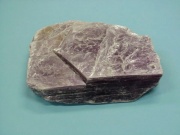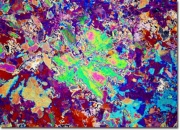Lepidolite
Jump to navigation
Jump to search
Description
A rose-violet color Mica with shiny hexagonal plates. Lepidolite deposits are found in the Czech Republic, Ural Mountains, South Africa, Brazil (Minas Gerais), and the U.S. (California, South Dakota, New Mexico). Lepidolite is a potassium lithium aluminum silicate. The translucent mineral is usually lilac or rose in color but may also be white, gray or yellow. Lepidolite is sometimes used as a in Glass and Ceramic production but it can release Fluorine gas resulting in bubbles.
Synonyms and Related Terms
lithia mica; lepidolita (Esp.); lepidoliet (Ned.); lepidolit (Pol.); lepidolite (Port.); Lepidolit (Deut.)
Risks
- Skin contact may cause burns.
- Inhalation and ingestion may cause irritation of membranes
Physical and Chemical Properties
- Monoclinic system usually in hexagonal plates.
- Cleavage is perfect in one direction.
- Luster = pearly.
- Streak = colorless.
- Translucent to transparent.
| Composition | K2Li3Al4Si7O21(OH,F)3 |
|---|---|
| Mohs Hardness | 2.5 - 4.0 |
| Melting Point | 1170 C |
| Density | 2.8-3.3 g/ml |
Resources and Citations
- Mineralogy Database: Lepidolite
- Richard S. Lewis, Hawley's Condensed Chemical Dictionary, Van Nostrand Reinhold, New York, 10th ed., 1993
- Robert Fournier, Illustrated Dictionary of Practical Pottery, Chilton Book Company, Radnor, PA, 1992
- Encyclopedia Britannica, http://www.britannica.com Comment: "lepidolite." (Accessed 8 May, 2002). color photo
- C.W.Chesterman, K.E.Lowe, Audubon Society Field Guide to North American Rocks and Minerals, Alfred A. Knopf, New York, 1979
- Wikipedia: http://en.wikipedia.org/wiki/Lepidolite (Accessed Sept. 7, 2005)
- Michael McCann, Artist Beware, Watson-Guptill Publications, New York City, 1979
- Van Nostrand's Scientific Encyclopedia, Douglas M. Considine (ed.), Van Nostrand Reinhold, New York, 1976
- Random House, Webster's Encyclopedic Unabridged Dictionary of the English Language, Grammercy Book, New York, 1997

